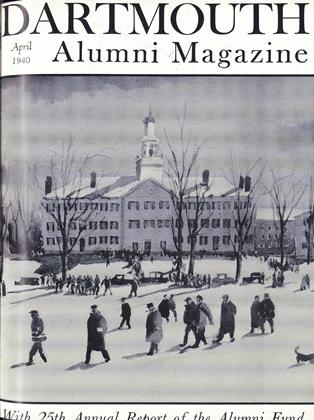DARTMOUTH COLLEGE HAS received a first payment of $133,000 on a bequest for the establishment of a memorial to Horace S. Cummings of the Class of 1862 and has applied this sum toward the cost of the Thayer School's new building, which, will be known as the Horace S. Cummings Memorial. The money received is the first installment of the residuary bequest left to the College by Mrs. Jeannette Irvin Cummings of Washington, D. C., who instructed that her entire remaining estate should go to Dartmouth upon the death of her sister, beneficiary of the trust fund.
The Cummings memorial will stand near Tuck School with particular appro- priateness, for Mr. Cummings was the lifelong friend of Edward Tuck '62 with whom he played as a boy in Exeter, N. H., and with whom he attended college in the same class.
Prior to his death in 1911, Mr. Cummings was a prominent attorney, was active in New Hampshire politics, and was engaged in banking, railroads, and the telephone industry in Washington, D. C. A graduate of Exeter and Dartmouth, he received his law degree at the Albany Law School and was admitted to the New York Bar in 1863. He went to Washington in the same year to take a position with the United States Treasury, but retained his legal residence in New Hampshire, serving as assistant secretary of the State Senate in 1863-64 and as secretary in 1865-66. He later represented the town of Exeter in the New Hampshire Legislature in 1876-77 and was aide to Governor Cheney in 1877.
Mr. Cummings began the practice of law in Washington in 1873, and in the following year married Miss Jeannette Irvin of Pittsburgh. He was first president of the National Capitol Telephone Company, later merged with the Bell Telephone Company; was vice president of two banks; was financially interested in the Florida Coast Line and Canal Company; and built and operated the Brightwood and Forest Glen Railroads in Washington.
 View Full Issue
View Full Issue
More From This Issue
-
 Article
ArticleRich Man's College?
April 1940 By JOHN HURD JR '21 -
 Article
ArticleMeet Bill Daniels—
April 1940 By CHARLES E. WIDMAYER '30 -
 Class Notes
Class Notes1930*
April 1940 By Chairman, ALBERT I. DICKERSON -
 Sports
SportsBig Green Teams
April 1940 By Whitey Fuller '37 -
 Class Notes
Class Notes1925*
April 1940 By Chairman, FORD H. WHELDEN -
 Class Notes
Class Notes1938*
April 1940 By Chairman, CARL F. VON PECHMANN







